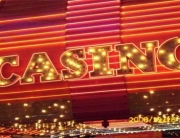
Steve Karoul is a recognized casino consultant with 35 years of hands-on experience with the best casinos both within the United States and internationally. He is also an authority on all aspects of casino marketing. Steve has lived in numerous countries and has conducted casino marketing activities in well over 100 countries around the world. He is an author, a lecturer and an educator who often injects his own hands on experiences and openly shares his ideas and thoughts with fellow industry executives. Telephone +(1-860) 536-1828 or skaroul@comcast.net or see www.euroasiacasino.com
During my many years of consulting, I have witnessed a continued evolution and growth in the Casino Management Software needs of various casinos around the world. It is an area that is often overlooked in the development stages of a new casino or during a pending software update. However, this area should not be taken lightly. There are actually many different options available but most suppliers only recommend a few of the larger systems to most casinos. Sometimes this can be overkill as well as extremely expensive for some casinos who may be perfectly satisfied with a less expensive casino management system.
A Casino Management System (CMS) serves as a focal point for the day to day processing and recording of operational transactions throughout the facility. Realistically, there is no one single vendor who offers all of the software that a major casino resort needs to operate and manage their facility. Consequently there has always been a need for a central management system that is capable of interacting and collecting meaningful information from the many “best of breed” operational systems commonly found in today’s modern casino facilities. Some of the basic applications that should integrate with your Casino Management Software include Slot Monitoring / Accounting, Slot Ticketing, Cashless Gaming, eGames Platforms, RFID Table Monitoring, Live Point of Sale Systems for Keno, Bingo, Race and Sports Book, Promotional Kiosks, Hotel, Food and Beverage Point of Sale, Surveillance and Security, Responsible Gaming, On-line Internet Gaming, Third Party Check Cashing, General Ledger, and Data Warehousing just to mention a few..
Making sense of this entire complex subject can be very difficult and often overwhelming for many casino operators or casino developers. I am often reminded by some of my software friends of just a few key items to remember when selecting a Casino Management System for your property:
- It is important to develop a basic check list of both the immediate and foreseeable future core functionality that must be present to implement any system. Itemize your “pain points” and ask the vendor how their solution solves them. It is a given that “out of the box”, a Casino Management System must be able to perform the myriad of standard core functions that your organization or casino requires. However, many casinos do not do this and end up paying a premium to upgrade after their initial purchase.
- It is important to carefully review the vendor’s available interfaces. Ask the vendor if they are willing and capable of developing additional interfaces in a timely and cost effective manner?
- Remember that there is no one vendor or system that is perfect and that a Casino Management System is never really “complete”. It must continue to evolve as your property’s needs change. All vendors will tell you that they are agreeable to customize or enhance their core system to meet your specific needs. But will they really do it and at what price? It is best to carefully evaluate the vendor’s track record and costs for delivering timely customer requested customizations and enhancements, training, and support services to determine if they can truly meet your needs in a timely and cost effective manner. Check references.
- We have all experienced situations where a client has chosen a management system purely on the basis of a vendor’s perceived image and size only to be quickly disappointed during the implementation. Do not be fooled by the old “we have 200 programmers and project managers available for your property” sales pitch. Not all casino operators’ needs are the same. Not all “big time” system developers are a match for every property or casino. Be realistic in assessing your organization’s IT and project management competency level as well as your ongoing need for service and support.
- If you do not feel confident in evaluating and defining your needs and evaluating and selecting an appropriate solution, seek professional help.
The following is a brief synopsis of an extremely flexible and cost effective casino management system available on the market today from a relatively small vendor as opposed to one of the industry giants. It is interesting to note that many of the components of any CMS are very similar in nature and therefore it is highly recommended that you at least understand the basics before beginning with software vendors.
This particular system known as the Casino Enterprise Management System (CEMS) is a proven and tested multi-site Casino Management System that has been developed with the internationally acclaimed and recognized Lansa 4GL language and development platform (www.lansa.com). The use of the Lansa 4GL language and development tools has facilitated the rapid development of a single set of 4GL programming code that is multi-platform capable. Because of the design of the Lansa development platform, users of the CEMS system are protected from rapid obsolescence as technology changes. This is an important point that one needs to consider before purchasing a new CMS since replacing systems can very expensive and disruptive to most organizations. Consequently, most operations tend to retain their systems for quite a long time. Check to see if your new system will be multi-platform capable or tied to a single 3GL programming language and deployment model. These points are especially relevant to the growing number of domestic and international multi-site / multi-venue operators.
This particular smaller CMS is one of the only systems in the world that can be deployed in a Microsoft Advanced Windows / SQL Server, Linux, or IBM iSeries computing environment. This gives their prospects and clients a variety of deployment options that can be tailored to meet their specific needs and preferences. Once again, you need to check on this in advance of purchase and also remember that the more flexibility, the better.
The particular system that I am referring to is a moderately priced turnkey system that can consist of hardware, software, networking, implementation and training, data conversion, customization and enhancement, and of course includes world class 24 X 7 software support and maintenance. Once again, I cannot stress enough that you need to carefully verify all such details in advance of purchase otherwise you may be quite surprised to find that your costs can rapidly escalate during the implementation and conversion to the new system.
I also recommend that you check ahead of time to see if your potential new casino software vendor will offer an option to purchase a license to use their “source code”. This option is for those casinos that are interested in or may become interested in developing their own modifications and enhancements for their own internal use in the future. If not, you may be held hostage to your vendor’s future pricing, scheduling, maintenance and support limitations for user customizations, and high cost of custom enhancements and updates. I always recommend to most of my clients that they actually do purchase the license to the “source code” with their system even if they do not currently employ a computer programmer at the time of purchase. At a minimum, there should be a provision in your contract to make certain that the source code is deposited with a reputable escrow agent. For those multi-site operators interested in standardizing their IT environment, it is also wise to review and negotiate the vendor’s volume licensing options.
The following represents a very high level overview of the most significant core CMS modules and additional “best of breed” software applications that work together to make up a typical Casino Management System.
It is important to understand the basics of a Casino Management System (CMS). The following are the major modules that make up a good Casino Management System and some fundamental items that should be considered when purchasing or upgrading to a new system:
- Patron Database
The Patron Database module is critical and at the very core of the patron loyalty system. It consists of a complete relational database of demographic and psychographic information. The ability to assign patrons a specific status is always a handy tool. Often, casinos will want to prohibit patrons with a specific status from gaming in general or participating in coupon, sweepstakes, or bonus promotions. This is especially true for employees that are allowed to enroll in the player’s club. In addition to extensive transaction detail display and search capabilities, the module must maintain an extensive system of historical transaction summaries by day, week, month, quarter, year, and any other user defined contiguous periods desired.
- Player’s Club Management
This module must include the ability to define and operate one or more multi-tiered player’s clubs. Based on a defined set of rules for promotion and demotion, the system should track a patron’s tier status points earned and have the functionality to automatically promote or demote players to their appropriate tiers if desired by management. In addition, the system must have the capability to manually promotion or demotion patrons individually or using a periodic batch process that functions based on the established club rules for promotions and demotions. The system also needs to have extensive capabilities to purge inactive patron points, merge accounts, and deactivate accounts and expire patron points based on the player’s club rules and a predefined set of internal parameters contained in the system setup.
- ID and Picture Scanning
This module allows for the automatic enrollment of a patron into the database by scanning a multi-dimensional barcode (such as that found on many US driver’s licenses) or scanning a magnetic stripe found on a patron’s valid identification card. Extensive logic should be included in the software to prevent the insertion of duplicate accounts or accounts with erroneous data. In addition, the system should have the capability to scan a patron’s picture ID and store it in the system for later display in cases where picture identification is either necessary or convenient to provide to your users of the system. Also make sure that the software can print a patron’s picture on the player’s club card if desired by management. This can be a very valuable tool to make available to your customer facing staff.
- Advanced Promotions
- Coupons
This module should be able to accommodate the issuance / printing, redemption, and accounting / analysis of in-house or third party barcoded patron coupons. It should allow the system administrator to define single or multi (book type) coupon promotions and the qualification rules for their issuance and redemption. Powerful logic is also needed in the system to provide for the definition of issuance exclusions by offer code, time of day, day of week, and also “bounce back” redemption restrictions.
- Sweepstakes Drawings
This module should be designed to accommodate the on-line or batch issuance / printing of paper or electronic sweepstakes drawing tickets. It should allow the system administrator the ability to define the rules for the qualification, issuance and printing of paper or electronic tickets. In addition, the module should include full capabilities to define and schedule the actual drawings, related prizes, and winners. A random generator is normally included for selecting drawing winners for electronic sweepstakes.
- Bonusing
This module should permit the system administrator to define and schedule patron point bonuses for all or selected groups of player’s club members. Bonuses normally are awarded for all patrons’ play or restricted to selected groups of patrons and types of play (e.g. Table, Slots, Keno, Bingo, and so forth).
In today’s competitive environment, bonusing along with coupons and sweepstake drawings will be very important to your marketing team. The more flexibility that these modules have, the more creative you can be in your marketing promotions.
- Groups & Events
The groups and events module should be designed to permit the system administrator to define groups or events for a consecutive date range and time period. The group module should also be able to work in conjunction with the Coupons, Sweepstakes, and Bonusing modules to serve as a “qualifier” for promotions that include issuance qualification rules that are based on membership in a particular group or series of groups. This module normally includes an easy to use function for enrolling a patron into one or many groups or events at a time. It also needs to contain an advanced set of reports for auditing and analyzing patron play and costs by group type, date, patron, and so forth.
- Junkets
A Junket module should enable the system administrator to define internal and external Junket Enterprise Organizations and their related junket representatives. This module should allow patrons to be assigned to junket representatives in order to monitor a patron’s activity and play. A complete set of date sensitive reports should be available for monitoring the activities of the patron’s assigned to a particular Junket Enterprise or Representative. This module will not apply to all casinos but the ones that do use or rely upon junket representatives for incremental business will appreciate this module.
- Comp and RewardsTracking
The system should support the concept of Comps as free goods and services provided to club members, to non-club members, or to employees. Rewards are normally defined as goods and services provided to club members and their guests in exchange for their earned reward points or reward dollars. The comp portion of this module should also support the concept of “Discretionary Comps” as those that are issued for free goods and services to club members based on an authorized compor’s “judgment” and the patron’s available discretionary comp points. Managing “discretionary comps” will require that this module has provisions for accruing and tracking “discretionary comp points” in a separate field apart from the patron’s normal earned point balance. Also required in this module is extensive functionality to define comp and reward offers, offer locations, offer authorizers, offer dollar limits, offer authorizer dollar limits, offer exclusion rules for patrons with a particular assigned status, and so forth. Make sure that this module includes optional provisions for requiring secondary approvals for such functions as voiding a comp or reward, issuing comps or rewards greater than a predefined amount, and so forth. Tin addition, this module must also be able to enforce any daily patron “cash back” and / or “free play” limits that have been established by your management for the property. These are the more sophisticated types of controls that are often found in a property’s written internal controls but frequently missing from on-line systems.
- Slot Accounting, TITO Ticketing, or Cashless Gaming
Regardless of your slot floor operating environment, there are many different businesses who can supply complete systems including, in game hardware, servers, player tracking interfaces, software, training and support to meet your precise needs. Remember that this system will need to interface with your casino management system in order to exchange a variety of information not the least of which will be a record of each and every patron slot session for any patron using their player’s club card. In addition, the system must also be able to accommodate whatever promotional play schemes that your property would like to utilize.
- Customer Service Kiosk
The customer service kiosk module should link directly with the Patron Database, Rewards, Coupons, Sweepstakes, and Bonusing modules. This module usually includes a simple touch screen interface that can be configured to allow customers to perform any combination of the following five basic operations.
- Check Their Account Balance;
- Change Their Mailing and eMail Information;
- Print a Reward Voucher;
- Print Coupons; and
- Print Raffle Tickets
Advanced customer service kiosk may include the ability to view property specific content related to your facility such as restaurant menus and hours, entertainment schedules, promotions, and events. In addition, completion of surveys, on-line catalogue prize ordering, advanced reservations, and so forth are all examples of advanced functionality that should be considered as well.
- Table / Cage Accounting
The Table / Cage Accounting module is a very important module and needs to be designed to accommodate casinos with single or multiple chip sets and currency requirements. It should account for all gaming chips by set and denomination and track the movement of all chips between any defined Cage location and the gaming tables. This module should support the tracking of computerized Chip Fills and Credits, Manual Chip Fills and Credits, Openers, Closers, Chip Buys and Sells, and Chip Transfers. Included in the module should be a flexible capability to input the multi-currency drop counted from all Table Games by day or shift. A complete audit trail needs to be maintained for all transactions as well as highly secured capabilities to perform chip transaction adjustment, voids, and undos. In addition to daily and shift reports, the system should also provide a complete set of multi-currency reports of Table Win / Loss by Week, Month, Quarter, and Year. Don’t forget your accountants, they will love it if the system can export to a CSV file the needed journal entries to record your table games revenue!
- Table Ratings
In general, the system must include the capability to define all of the factors used to calculate a patron’s theoretical session win (theoretical hold by game variation, game speed, worth percentage) and assigned worth for the patron’s session of play. Handy features to have are provisions that can factor into the rating multiple bets, player skill, and quick loss events. Strong audit trails and controls must be available that allow the system administrator to set limits and secondary over-ride approvals for voiding and correcting ratings as well as entering ratings that exceed selected limits.
- Casino Credit, Check Cashing, and Front Money
The system should allow a casino to record a variety patron bank account information, employment information, as well as requested credit and approved credit and check cashing limits. The system needs to support a wealth of different transactions related to the administrator of casino credit, check cashing, and front money. Transactions such as the issuance/printing of pit or cage markers, front money withdrawals, buybacks of checks and markers, consolidations, substitutions, redemptions, and so forth must all be a part of this module. Of course, this module needs to have strong and effective audit controls and of course a full complement of audit reports, deposit logs, and trial balance reports.
- Interfaces
- Slots, Keno, Bingo Point of Sale
The system should interface for player tracking and promotional purposes to your Slot Monitoring / Slot Ticketing / Cashless Gaming System. In addition, it is very useful to be able to interface with any other gaming related systems present at the property such as Keno, Bingo, Off Track Betting, Sports Book and others.
- Food & Beverage Point of Sale
The Food and Beverage Point of Sale interface should be designed to allow an authorized cashier to depress a “rewards” key to initiate a settlement transaction by swiping a patron’s player’s club card as payment. The interface should also support the settlement of “paper rewards or comp” vouchers by depressing a “manual reward” or “manual comp” button and entering the voucher number into the Point of Sale system. Make certain that the system includes extensive controls such as the ability to prohibit the redemption of expired or previously redeemed vouchers. As always, this module must include a variety of audit and accounting reports. A real nice feature to also have in the interface is the ability to redeem bar coded promotional coupons by patron.
- Multi-site Communication Module
For those multi-site operators, it is critical to carefully consider your needs for a single card / single account player’s club in relation to how the vendor would propose to implement it. If you are a multi-site operator and are interested in a single card / single account system that would allow your patrons to earn and redeem reward points at any location within your brand, it is critical to make certain that this can be implemented with the system without sacrificing the ability to implement different marketing and promotions programs at each of the properties and forgoing the necessary accounting by site that is usually necessary. Beware, not all systems are capable of performing such a task! To accomplish this task, some multi-site operators have adopted a “decentralized” approach to implementing their one card / one account solution for their brand. They have recognized that for a variety of reasons, it is best that each gaming site has their own autonomous system. To accomplish their cross property / one card / one account goals, they have utilize an intelligent central control module to “cross publish and synchronize” selected information such as common setup tables and user accounts, patron name, address, tier level, and point balance activity. I must emphasize that the key to this type of multi-site structure is that it allows each property to have their own local database, implement their own unique marketing and promotions programs at each site, and fulfill their entire site accounting mandates as well. You may never need this but better to be prepared just in case. The additional cost in the beginning is small in comparison to changing systems in the future.
- Patron Data Warehouse
The Patron Data Warehouse module should be supplied a wealth of data directly from the Casino Management System and other operational systems throughout the property. This will depend on the needs of the property. It is important to ask all prospective vendors if they have a pre-built data warehouse. If so, examine carefully the fundamental data available. Determine the specific programming tools that have been used to develop the warehouse. At a minimum, examine the tools used for Extracting, Transforming, and Loading the data from your CMS and other operational systems to the warehouse. Query the vendor as to whether they support enhancement, modification, and integration of other needed data to the warehouse. Review the presentation tool that is used to “slice and dice” the pre-defined presentations supplied with the system as well as the construction of new analytic presentations in the form of spreadsheets, graphs, and reports. Do not be fooled by the old salesman’s trick of “hey hey step right up and I’ll show you how many patrons in your database are over 65 years of age” trick! Test the warehouse with some real life complex analysis requests that you have always wished could be answered for your property.
As one can see, the purchase of a Casino Management System (CMS) is not a simple process. It really requires considerable advance thought and planning prior to purchasing and prior to implementation. Therefore, it is critical to at least understand the basics of what a CMS is and what a CMS is not. However, the time and effort put into advanced planning will more than pay for itself in the form of future benefits to any casino operator. I found a great company so if anyone wants a recommendation please contact me. Good luck.
(Please feel free to copy or forward to anyone in your network or company that you think may benefit from my educational articles. Cheers….Steve Karoul)






